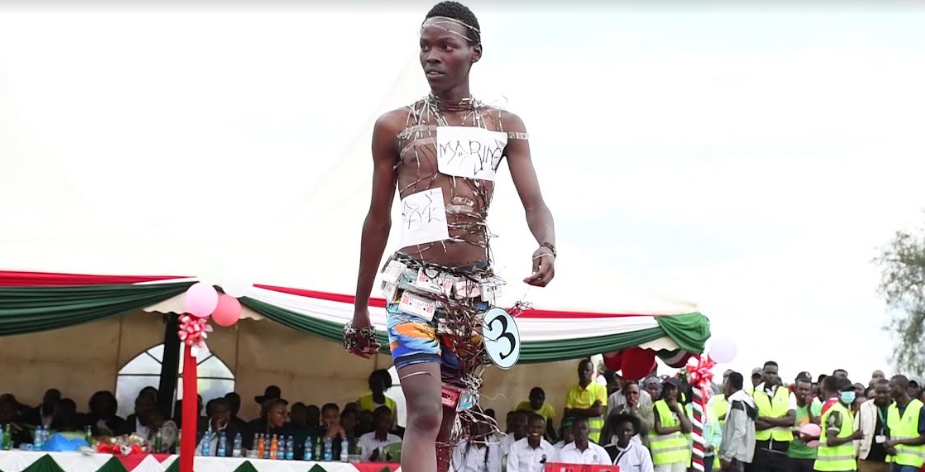Rift Valley National Polytechnic (RVNP) has launched a beauty pageant that will be held annually to inspire young people’s participation in climate change actions and initiatives.
According to RVNP Principal Mr. Sammy Chemoiwa, the participation of young people in climate change actions was important, adding that harsh climates compromise agricultural productivity.
He disclosed that the pageant would be an avenue for sensitising the communities in Nakuru, Kericho, Baringo, Bomet, and Narok counties on the measures needed to survive harsh climatic patterns.
Mr. Chemoiwa indicated that the institution was training its students to be influential tools for the mobilisation of environmental consciousness and agents of transformation.
The principal expressed concern over the huge gap between the youth who understand what to do about climate change and those who are aware but cannot do anything.
He said there is a need for a deliberate effort to build a young population that can come up with solutions to the worrying environmental situation in the world, especially in Africa, which is more affected by climate change.
“I believe that the RVNP beauty pageant, just like all beauty competitions, should not just be catwalk runway shows. It will be used as a platform to advocate for societal changes. This is what this competition is all about. The beauty pageant, deeply vested in sustainability, is pushing for an eco-friendlier approach to fashion, “said the principal.
The principal called for the use of beauty pageants as a platform to promote environmental awareness and action. He said this year’s pageant, themed ‘Infusing diversity and inclusion to mitigate climate change’, seeks to promote environmental conservation locally and regionally.
“We are preparing our students to serve as brand ambassadors and eco-warriors, championing a pure environment. We are championing environmental conservation. We need to keep pushing the 3Rs (Reduce, Reuse, Recycle). Climate change is real, and we have to make a change as early as now.”
The pageant also plans to promote ecotourism as an incentive for environmental awareness and sustainability. “We believe that promoting sustainable tourism practices can help protect our environment while promoting economic growth and community development,” said Mr. Chemoiwa.
In addition to waste management, the RVNP beauty pageant will also focus on creating awareness and practicing environmental sustainability in schools and general public spaces.
“This is a crucial area of focus, as environmental sustainability should not be a privilege reserved for the wealthy. “We need to create a world that is sustainable for future generations. Through sustainable fashion and other environmental conservation efforts, we can achieve that goal,” stated the principal.
Mr. Chemoiwa disclosed that RVNP, through its Fashion Design, Clothing Technology, and Garment Department, was taking steps towards a more sustainable future. “We are incorporating eco-friendly materials into our designs and adopting circular business models. RVNP is also recognising the importance of transparency and traceability, with consumers increasingly demanding to know the origin of the products they purchase.”
The principal indicated that integrating youth into established climate frameworks is pivotal to nurturing their involvement in shaping a sustainable future for Africa. Empowered by firsthand experiences, he added, young individuals drive climate action forward.
“Youth engagement in climate change is more than a symbolic gesture—it’s a movement gaining formidable momentum. A recent UNDP People’s Climate Vote showed that nearly 70 per cent of those under 18, view climate change as a global emergency,” observed Mr. Chemoiwa.
A study by a non-governmental organisation called ‘Spearheading Green Workforce Preparation in Africa’ established that out of the 13.8 million Kenyans aged between 15-34, only 7.5 million know what to do to alleviate the impact of climate change.
This is despite the fact that 12.4 million, or about 90 per cent, of the total youth population in the country have knowledge of climate change and its causes.
The 2019 national household population census puts the number of young people aged 15–34 in the country at 13,777,600, or about 29 per cent of the total population.
Over the last 100 years, climate change has been a global issue. Rising temperatures, rising sea levels, coastal erosion, and extreme weather events like floods, landslides, and severe droughts are some of the manifestations of climate change.
Mr. Chemoiwa observed that while youth unemployment remains a challenge in many African countries, the current focus on climate action in Kenya and subsequent potential investments present an excellent opportunity for re-skilling and up-skilling the workforce here and elsewhere in Africa.
He pointed out that there is a growing green economy which has the potential to create jobs and lead to the transformation of livelihoods.
The principal indicated that RVNP had taken a front-line role in research on climate change and finding solutions to the resultant consequences.
He added, “It is time the continent relied on its own resources on matters of scientific research and, more so, human resources.”
RVNP Dean of Students, Mr. Joseph Keraru, noted that educational institutions can unlock a powerful force for change by imparting a comprehensive understanding of climate change issues. He said youth, driven by creativity, innovation, and boundless energy, stand poised to be the catalysts of change.
Mr. Keraru stated that the beauty pageant was one of the avenues where the youth’s ideas, innovations, and solutions are meaningfully being embraced and supported with resources, including funding and skills, to help them advance to the next level.
“In a world where the stakes have never been higher, it is imperative that we open doors, amplify voices, and welcome the youth into the global conversation. As we navigate the complexities of climate change, their involvement is not just an option—it’s an essential pathway towards a more sustainable and resilient future for all,” the Dean pointed out.
He observed that in a world grappling with the dire consequences of climate change, it was evident that youth and millennials were the most powerful catalysts for change and should take the reins of leadership in addressing the global climate crisis.
RVNP student leader Mr. Ledama Milton affirmed that the voices of youth should be given prominence considering that they are the ones living in the reality of the effects of man’s abuse of the environment.
“Young people understand their future is at stake, that they are agents of change, they are innovators, and a valuable force in climate action, and for these reasons, their voices should be amplified,” noted Mr. Ledama.
He pointed out that one of the most compelling reasons not to ignore the voices of youth is that the long-term consequences of the climate crisis will impact them. Unlike the older generations who often dominate climate discussions and policymaking, Mr. Ledama observed, it is the young generation that stands to suffer the most from climate change.
“With more years ahead of them, the young generation will be forced to grapple with the severe consequences of global warming that are causing extreme weather patterns, rising sea levels, water scarcity, and food insecurity.
By amplifying their voices, we will be acknowledging the fact that it is the young generation that will shoulder the heaviest burden of the older folks’ actions and inaction. The youth’s perspective is therefore essential in shaping policies that will protect their future,” said Ledama.
Mr. Ledama stated that the young generation is known for its creativity and innovation; thus, if given a platform, they get a chance to breathe new life into climate action. The youth are not intimidated by conventional wisdom.
Moreover, the student leader pointed out that technology has given the youth a louder voice to speak up on issues such as adopting sustainable agricultural practices and technologies and advocating for renewable energy sources.
“Unlike the older generation, this generation is extremely comfortable with social media, which gives them a platform to discuss the urgency of climate matters and give solutions for green growth and finance. This ability to think outside the box can lead to significant strides in mitigating the effects of climate change.
In addition, the youth have boundless energy and unwavering passion to implement possible solutions. Young activists across the globe have proven their ability to mobilise peers in the climate movement,” he indicated.
Historically, according to the student leader, the youth have been left on the sidelines in decision-making processes, which should never have been the case. He affirmed that the youth’s potential impact knows no age limit, as multiple studies show that education is pivotal in driving public opinion on climate change.
By Jane Ngugi and Dennis Rasto



